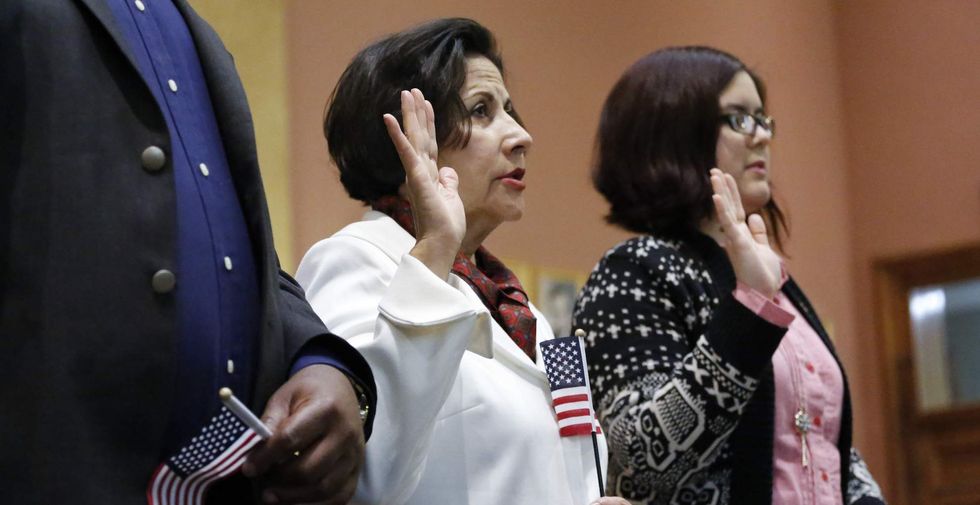
According to a New York Times report, Maryland Democrats are “surprised” to see legal immigrants oppose so-called sanctuary city policies. The Times called them an “unlikely source” of dissent. (Kena Betancur/AFP/Getty Images)

Democrats in Maryland recently made a “surprise” discovery: Legal immigrants oppose so-called sanctuary city legislation, the New York Times reported Monday.
In the Times article, titled “Sanctuary Bills in Maryland Faced a Surprise Foe: Legal Immigrants,” reporter Sabrina Tavernise wrote that a vetoed sanctuary city bill in Howard County, Maryland, “met stout opposition" from what Tavernise called "an unlikely source": legal foreign-born residents.
Sanctuary cities are municipalities that do not fully comply with federal immigration authorities or regulations. Tavernise was reporting on that bill from Howard County, where 1 in 5 residents was born outside the United States.
In early February, the Howard County Council approved a sanctuary policy in a 3-2 vote, but shortly after the measure was advanced, Howard County Executive Allan Kittleman, a Republican, vetoed it.
The council failed in March to override Kittleman’s veto. Only three of the council’s four Democrats voted in favor of the sanctuary bill. Howard County Council Chairman Jon Weinstein, a Democrat, and Councilman Greg Fox, the sole Republican, voted against it.
The final tally was again 3-2, just one vote shy of nixing Kittleman’s veto, the Howard County Times reported.
Legal immigrants say “offering sanctuary to people who came to the country illegally devalued their own past struggles to gain citizenship,” Tavernise reported. She spoke with a handful of legal immigrants who made clear to her their opposition to the Howard County sanctuary bill.
And the Democrats in the local jurisdiction aren’t the only lawmakers to have proposed sanctuary legislation recently. In fact, in March, the state legislature attempted to pass a similar bill called the Trust Act, which would have essentially made the entire state of Maryland a sanctuary for illegal immigrants.
However, Senate President Thomas V. Mike Miller Jr., a Democrat, said, “Maryland is not going to become a sanctuary state,” the Washington Post reported.
“Our churches are not sanctuaries, our colleges are not sanctuaries, our cities are not sanctuaries, and our state is not going to become a sanctuary state,” he continued, according to the Post. “I haven’t lobbied anybody in the committee, but I definitely will tell you the committee is not going to vote to allow Maryland to become a sanctuary state.”
The sanctuary state legislation was pulled not long after Republican Gov. Larry Hogan vowed to veto the measure.
The failure of both the Howard County and the statewide bills surprised some Democrats, given, as the Times report explains, “their party has staked out an activist position built around protecting undocumented immigrants.”
Taversine, addressing Democrats’ surprise at legal immigrants who oppose sanctuary policies, wrote that the measures have “alienated many who might have been expected to support it.” The Times reporter seemed to be surprised by that development herself, too, later noting that legal immigrants are “unlikely” dissenters to sanctuary laws.
“Their objections stunned Democratic supporters of sanctuary here and helped bring about the bill’s demise in March,” she wrote of the Howard County measure.
Salvadoran Stanley Salazar, 37, told Tavernise he was concerned that the violent crime already facing many of Maryland’s suburbs, much of which has been tied to illegal immigrants, would eventually impact his daughters.
Salazar was once an illegal immigrant himself. In 2001, he traveled to the U.S. on a tourist visa, but shortly thereafter, his temporary legal status expired. He lived in Maryland illegally until 2007, when he got his green card.
He told the Times that a sanctuary bill would be bad for Maryland because of the recent uptick in murders committed by MS-13, a violent gang based in El Salvador.
“I have three daughters right now and I’m thinking about them,” he told Tavernise. “Don’t I have the right to be afraid that this kind of stuff is increasing?”
One legal Chinese immigrant, J.D. Ma, a lawyer who voted for then-Democratic presidential candidate Hillary Clinton in 2016, opposes sanctuary laws because “being in America is such a high privilege.”
“As an immigrant, I really feel it,” he told the Times. “You cannot easily give that privilege to somebody without going through some kind of process. It’s like giving lots of gold for one dollar.”
Ma also drew a comparison between the way entering the U.S. illegally — a crime — is treated by some lawmakers as opposed to breaking any other laws.
“If a single mother commits a crime and has to go to jail, we don’t say, ‘Oh, we can’t do that, because it will break her family,’ ” he explained.
The Times spoke with two other immigrants — both Democrats — who expressed frustration over the idea of offering a safe haven free from legal ramifications to those living in the U.S. illegally.
Biplab Pal, a 43-year-old entrepreneur, said he is concerned about crime. He told the Times he used to live in Los Angeles, in an area with a large share of illegal immigrants and high amounts of crime — a connection that, he said, is not a coincidence.
“Do we really want more illegal immigrants in our country?” he asked. “I don’t think the answer is yes.”
Hongling Zhou, a statistician, said she is concerned about the public school system. She told the Times she fears carving out a safe space for illegal immigrants would increase school attendance and force teachers to be spread too thin.
Last month, a federal judge blocked an executive order signed by President Donald Trump that would have barred jurisdictions enacting sanctuary city policies from receiving federal funding. At the time, the White House described the decision as an “egregious overreach by a single, unelected district judge.”
The president called the ruling “ridiculous.”